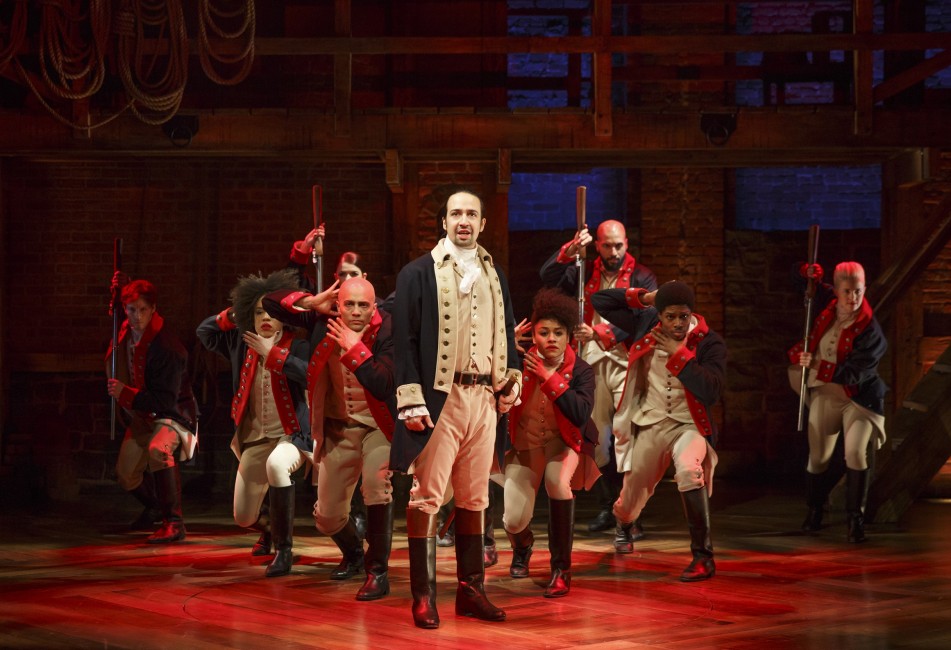“Hamilton: An American Musical,” smashing through traditional theater boundaries with its must-see contemporary telling of a history lesson about an unlikely founding father, is the subject of two new Northwestern University courses that will begin in winter quarter.
The Northwestern professors who created and will be involved in the teaching of the two courses hope students will not “throw away their shot” to learn about the life and times of Alexander Hamilton and the groundbreaking hip hop-inspired musical.
“Hamilton’s America” will be taught by history professors Geraldo Cadava and Caitlin Fitz, who will explore Hamilton the man as well as “Hamilton” the musical, attempting to account for its extraordinary contemporary resonance.
“Why has this past person’s life inspired such interest today, in a nation that looks so different from the one that Hamilton and his enemies knew?” asked Cadava, associate professor of history in the Weinberg College of Arts and Sciences. “But the important point isn’t about Hamilton himself, but about the power of history to shape and reshape the world we live in today.”
“Hamilton: Bullets, Banks, and Broadway,” an interdisciplinary course, will be taught by legal studies professors Laura Beth Nielsen and Joanna Grisinger, with the help of faculty from theatre, African American Studies, communication, political science, School of Education and Social Policy, English and history.
“I want to use this as a moment to showcase some of the extraordinary faculty on the Evanston campus,” said Nielsen, director of the Legal Studies program and professor of sociology in Weinberg.
“Students, for example, who otherwise might not have taken a class from Harvey Young [theatre] or David Figlio [School of Education and Social Policy] or Caitlin Fitz [history], will have the opportunity to see not just how their different disciplines approach the task of decoding ‘Hamilton,’ but also how other professors actually do that in the classroom.”
Why has this past person’s life inspired such interest today, in a nation that looks so different from the one that Hamilton and his enemies knew? But the important point isn’t about Hamilton himself, but about the power of history to shape and reshape the world we live in today.”
associate professor of history
Fitz, assistant professor of history, said she’d like students to come away with an appreciation of the difference between history and memory.
“Between our historical accounts of what happened and the ways in which people today imagine and remember that past, it will be fascinating to explore where the musical departs from the history, and to think about why Lin-Manuel Miranda made those decisions,” said Fitz, who also will be one of the lecturers in the legal studies course.
Covering Hamilton’s life and politics, the course also will explore early American notions of honor and masculinity, marriage and infidelity, freedom and slavery.
After seeing “Hamilton” for the first time recently, Cadava and Fitz don’t plan to change how the course is organized, but there’s a possibility specific lectures could be reshaped.
“Seeing some of the hip hop-inspired choreography and body language between the actors helped me see the founders and their cohort — their children, their wives, their associates in Congress — as not all that different from us,” Cadava said. “It helped me collapse time between early America and the present.”
After the performance, Fitz said she appreciated even more that “Hamilton” is a work of art. But, in recognition of the history, she still plans to offer a devil’s advocate case for the Loyalists.
“I’ll still explain why so many Americans remained loyal to or at least ambivalent towards the British Empire,” Fitz said. “But I’ll be coming from a place of appreciation for the brilliance of the theatrical portrayal and eager to build off of that as a starting point for conversation.”
Lecture Topics
Lecture topics in “Hamilton: Bullets, Banks, and Broadway” include “Building a Constitution: Who’s Included and Not Included in the Story of the Founding”; “Dueling Culture, Reputation, and Honor in Early America and Today”; and “Founders’ Chic: What Would Hamilton, Jefferson, Madison, and Washington Think if They Were Alive Today? And Should We Care?”
Harvey Young, chair of the theatre department in the School of Communication and one of the course’s lecturers, said he hopes the class helps students appreciate the value of interdisciplinary and cross-disciplinary thinking.
“Very few topics or issues are the provenance of a single academic discipline,” Young said. “The class reminds us of our similarities even as it introduces us to differing perspectives on a range of topics that commonly interest us.”
And since students will get the opportunity to see Broadway in Chicago’s production of “Hamilton” in January, Young said he will give them the tools to critically read live performances.
Nielsen has woven Hamiltonian themes into a current course she’s teaching, “Law and Society” (sociology and legal studies). She said the class is just one part.
In collaboration with the Newberry Library and the Jack Miller Center, Nielsen recently took students downtown to the Newberry to hear a lecture by Yale historian and Hamilton scholar Joanne B. Freeman. Miranda used Freeman’s book “Affairs of Honor” to write the song “Ten Duel Commandments,” which appears on the “Hamilton” soundtrack.


